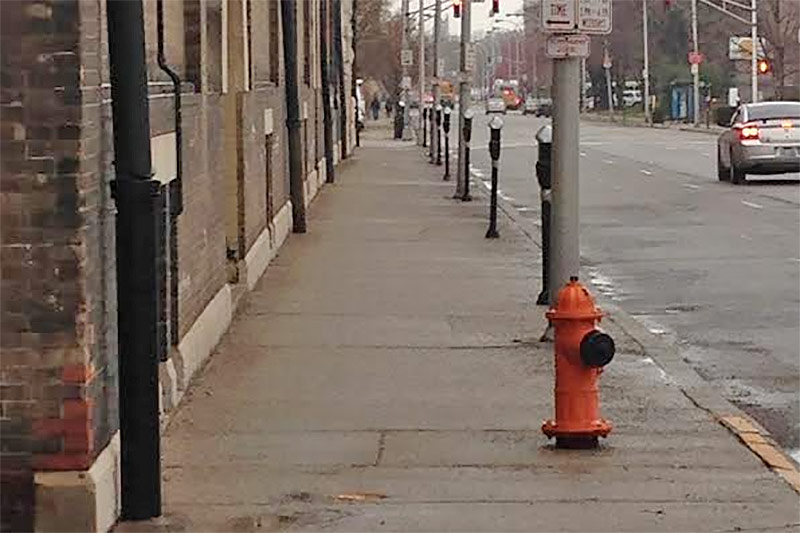A big congratulations to Scott Brickey for correctly identifying our last sidewalk challenge—which was a particularly tough one. The sidewalk view from a flood in 1945 was taken from the corner of 41st Street and West Market Street nearby the Academy at Shawnee. Many of the buildings have been torn down, but one on the corner still stands today.
Here’s a new sidewalk challenge for this week ready to be identified in the comments below for your chance to win an official Broken Sidewalk magnet. (The rules: First correct response wins; Leave a real email so we can get in touch if you win; No repeat winners for four months; Comments must be left on this news roundup.) Good luck!
And now on with the week’s top urbanism #cityreads in the news:
Co-Op Success in Cleveland Is Catching On. Lets lead this roundup off with some good news, based in part on the Mondragon Corporation workers cooperative located in the Basque region of Spain, Cleveland’s Evergreen Cooperatives is building an incredibly interesting and strong model for a cooperative economy. Pay attention, Louisville! Next Cities
A Response to the Loss of Black Communities in Portland. On a similar note, Louisville, here is what local leaders ought keep in mind as they visit the original city of “keeping it weird:” Portland, Oregon is the whitest city in the country. Ifanyi Bell pens a thoughtful piece on race, space, and belonging. There’s also an accompanying video funded by the James F. and Marion L. Miller Foundation. Notice, nobody says gentrification once, but you know exactly what they mean and why the ‘G’ word is absolutely appropriate here. Planetizen
Would Automatic Voter Registration Increase Turnout? An incredibly important piece to the current anti-sentiment to the restoration of voting rights in Frankfort; Oregon teaches us that there’s one sure way to guarantee that voters have a say in how our cities are formed: recognize (and enforce) their civil right to vote. NPR
Listen to a Day at Work With a Louisville Case Manager For the Homeless. Tackling homelessness in our cities could be the urbanist-meets-human rights issue of our time. Jacob Ryan reveals the everyday urbanist in our city like Sarah Buckler. WFPL
Tackling Philly’s Segregation Problem With Park Designs. Philly is taking on an ambitious program to address segregation through public space design. Can parks be reworked as democratizing agents? City Lab
Dallas Addresses Transit-Dependent Poverty. “In car-friendly Dallas, poverty often means lack of access to the dominant form of transportation.” Planetizen
Housing Report Card Shows Working Families Being Forced out of Boston. “25 percent of Greater Boston residents spent more than half of their monthly income on rent alone. While such housing burdens are increasingly common throughout the country, Boston outpaced even New York City in housing price and rent increases between 2000 and 2007, setting the stage for today’s affordability crisis.” Next City
Drilling Down to the Real Role of Bike Lanes in Social Equity. “Can better bicycle infrastructure help make cities more just and equitable places? That may be asking too much of some simple bike lanes. But a new “idea book” from PeopleforBikes and the Alliance for Biking & Walking called ‘Building Equity: Race, Ethnicity, and Protected Bike Lanes‘ explores the possibilities.” City Lab
Mapping the Lasting Effects of Redlining. These maps are a direct link to how our cities were constructed to be segregated and unequal. Most of these maps remain inaccessible and under analyzed by the general public. How can we put excellent resources like these into use? City Lab
How Activists in 3 Cities Are Fighting Evictions. Many “right to the city” organizations are focusing their efforts on combating the antiquated and unjust (in this climate of economic crisis) practice of evictions. Here’s how three groups in three cities are taking on these battles. Next City



Sixth Street looking south towards Muhammad Ali.